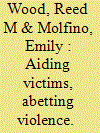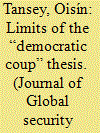| Srl | Item |
| 1 |
ID:
147487


|
|
|
|
|
| Summary/Abstract |
Annual allocations of bilateral and multilateral humanitarian assistance to conflict-affected states total billions of dollars each year. Humanitarian assistance plays a vital role in sustaining vulnerable populations. However, inflows of such aid may also exacerbate violence by both threatening insurgents and creating incentives for these groups to extend or deepen control over the areas in which aid is concentrated. Insurgent efforts to ameliorate threats and co-opt resources ultimately raise the risk of conflict between insurgent and counterinsurgent forces. We use recently constructed geo-located data on both aid commitments and conflict events in a sample of twenty sub-Saharan African countries during the post–Cold War era to evaluate the impact of aid on violence. Even after accounting for the non-random assignment of aid within conflict zones, we find that humanitarian aid increases the frequency of subsequent violent engagements between rebel and government forces in the areas in which aid is concentrated. Importantly, however, we find no evidence that other forms of foreign development aid exacerbate or prolong violence in the areas in which they are allocated.
|
|
|
|
|
|
|
|
|
|
|
|
|
|
|
|
| 2 |
ID:
147489


|
|
|
|
|
| Summary/Abstract |
Recent studies have suggested that post–Cold War coups are more likely to be followed by democratic elections than their Cold War predecessors; analysts attribute this trend to international policies of democratic conditionality. Some go so far as to argue that we live in an age of the “democratic coup.” This paper raises questions over any optimistic view of the capacity of coups to contribute to long-term democratization. An analysis of countries’ post-coup trajectories after 1991 demonstrates that there is, consistent with previous studies, a clear trend of holding elections within five years of the coup. However, I show that most countries experiencing coups fail to go on to establish high-quality democratic rule. Instead, they often consolidate into some form of authoritarian rule. The paper ratifies the importance of the international political environment but highlights the role of international autocratic sponsors. When states are strategically important or have strong linkages to non-Western autocracies, coup leaders are likely to receive international support and protection rather than condemnation and sanctions. The article illustrates these arguments by examining post-coup authoritarian consolidation in Egypt and Fiji.
|
|
|
|
|
|
|
|
|
|
|
|
|
|
|
|
| 3 |
ID:
147490


|
|
|
|
|
| Summary/Abstract |
What factors drive politically motivated cyberattacks? Our research focuses on one particular kind of cyberattack: politically motivated, distributed denial-of-service attacks (DDoS). We argue that denial-of-service attacks are a particular form of a larger category of political contention that is more similar to nonviolent than violent activism. We offer a country-level explanation that helps establish why some nation-states are more likely to suffer such attacks while most others are not. When we control for wealth and Internet penetration, the strongest factor explaining why a country is more likely to suffer DDoS attacks is the dangerous combination of repression and a highly educated population. The results have important implications both for the scholarly study of this form of contention, as well as for policymakers grappling with this new form of activism.
|
|
|
|
|
|
|
|
|
|
|
|
|
|
|
|
| 4 |
ID:
147488


|
|
|
|
|
| Summary/Abstract |
Many scholars have sought to understand what drives recruitment in armed rebel groups. While theories focused on grievance and selective incentives have been the subject of a robust body of scholarship, large-N work in this area tends to focus primarily on male recruits, and often utilizes measures that fail to account for the differing motivations of male and female rebels. Moreover, existing studies of the motives of female rebels have been regionally focused or concentrated on a single case—calling into question whether the findings are consistent across the global population of females in armed rebel groups. Drawing on a data set measuring women’s participation in seventy-two active rebel groups since 1990, this work seeks to test hypotheses drawn from prior research to explain why women rebel. These tests indicate that some trends noted by previous researchers have explanatory power. Particularly, economic and ethnic or religious grievances are motivating factors that drive women to take up arms. At the same time, though, these findings cast doubt on the salience of other motivating factors, such as selective incentives and a desire for political participation.
|
|
|
|
|
|
|
|
|
|
|
|
|
|
|
|